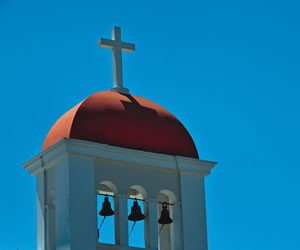Growth sectors in the meetings market may be hard to come by these days, but among those counting good numbers are religious meetings. Sales managers at CVBs, hotels and convention centers know this niche can be counted on to hold steady and even deliver impressive attendance and revenue figures, no matter what the economic climate.
Planners of faith-based meetings are the focus of attention these days, according to DeWayne Woodring, executive director of the Religious Conference Management Association (RCMA).
"Religious–meeting planners are finding they are some of the most popular people around these days," he says. "They are being deluged with sales calls, mailings and special invitations to participate in FAM trips.
"Sales professionals realize that through the years, the religious segment of the meetings industry has shown to be the one that holds steady. When compared to the more volatile corporate meetings market, it can be counted on to deliver."
According to Woodring, spiritually focused meetings and conferences are recession-proof, stemming from the fact that when times are bleak, the devout turn to their faith for guidance and support. By contrast, the corporate world is economically driven, he adds.
"So when problems arise, they take an immediate toll on business," he says.
Religious meeting planners are usually after the most affordable rates, so they frequently meet during "value" seasons, often summer. This makes them even more attractive to cities seeking to boost their visitor counts and occupancy rates during slower times of the year.
The latest RCMA survey shows annual attendance at meetings conducted by RCMA planner members is over 11 million and rising. Conventions and conferences counted 9.2 million of that total, followed by 530,416 attendees at committee meetings and seminars. The rest were retreats and board meetings. Room blocks—many in downtown hotels—were also significant. Groups needing 100 to 200 rooms for their largest meeting accounted for 18 percent, while meetings neededing 10 to 50 rooms came in at 15 percent.
Downtown hotels are the top choice of religious meetings groups, with conference centers as their second most popular options. Religious planners are showing more interest in suburban hotels, followed by convention/civic centers, camps and retreat centers. Resorts, airport hotels, college and university campuses and cruise ships are also in the facilities mix, but with single-digit popularity.
Only about five percent of religious meetings need more than 3,000 sleeping rooms, but a majority of religious meetings use exhibit space, with 69 percent reporting they needed show space.
A Desirable Market
Given their consistency, it’s not surprising that religious meetings are highly sought after by many hotels and CVBs these days.
Among them is the Westfields Marriott Washington Dulles in Northern Virginia just outside Washington, D.C. Through a marketing partnership with the region’s leading Christian radio station, WAVA-FM, the hotel has doubled its weekend religious meetings business, according to Louis Nicholls, director of sales and marketing.
"In exchange for tradeouts for F&B, meeting and sleep space, we get radio time that has proven to be a powerful business builder," Nicholls says.
He adds that the religious meetings sector really began to take off last year when Westfields hosted a breakfast on-site for pastors from around the D.C. region—key decision-
makers for retreats and other types of events.
In Atlanta, religious meetings have long been an important part of the city’s meetings business, according to Mark Vaughan, executive vice president, chief sales and marketing officer for the Atlanta CVB.
"From the beginning of 2008 until the end of this year, we will have over 280,000 attendees in this sector," he says. "We also get about $100 million a year in revenues from it. One of the reasons the religious sector is so important to us is because it meets in summer months and weekends during times when associations and corporations aren’t in town."
Some of the major meetings from the religious sector arriving in Atlanta this year include Seventh Day Adventist Church with 70,000 attendees; Passion Conference, with 20,000 attendees; and Full Gospel Baptist Fellowship, with 8,000 attendees.
Another city that courts the religious market is Nashville, Tenn., which is sometimes called "the buckle on the Bible belt," according to Kay Witt, the Nashville CVB’s senior vice president of sales.
"I have a person dedicated to the SMERF market," she says, "and another dedicated to multicultural groups. We find the religious market has its unique challenges, and sometimes a group is desirable for hotels and sometimes not, mainly because they don’t bring in so much ancillary revenue. So we have to find the right dates and rates for some to be a fit.
"The good news is they don’t usually book short term as so many other sectors are now doing," she adds. "There’s still a lot of demand and the segment really hasn’t dipped for us."
Among the larger groups the Music City is welcoming this year are National Religious Broadcasters, with 7,000 attendees; Presbyterian Church in America, with 4,000 attendees; and Youth Specialties, with 4,500 attendees.
And there’s likely to be more on the bureau roster as groups take advantage of the CVB’s "Nashville for a Song" incentive that affords rebates of a dollar per room night, comp meeting space, airline tickets and even a singer-songwriter performance for qualifiers.
In Texas, the Fort Worth CVB also has a salesperson dedicated to the religious market. The city was RCMA’s destination choice for its 2010 January conference, which drew over 1,000 attendees, including 350 planners and 650 suppliers.
According to David DuBois, CMP, CAE, president and CEO of the Fort Worth CVB, attendance surpassed that of the 2009 conference in Grand Rapids.
"We are careful in the way we message religious meeting planners," he says. "We talk about Fort Worth’s walkability, safety and family-friendly character. But we don’t talk about shrimp and champagne activities and some kinds of entertainment."
The religious segment is more price sensitive, he adds, because attendees are often paying their own way, and cannot afford to spend in the same way corporate attendees do.
Although corporate meetings are growing in importance for Forth Worth, which has increased its inventory of upscale hotel rooms, DuBois says that doesn’t mean that religious meetings have grown any less important to the city.
"We are chasing every market for this city, and we’re in year two of our MealDeal program that’s underwritten by the bureau and supported by our hotel partners," he says. "If a meetings group even considers Fort Worth, we will give them a F&B credit at the convention center hotel of their choice.
"This is based on the number of room nights they use. They can apply it to coffee breaks, meals or receptions. Hotels bill us their costs and we rebate to them. The funding is from room tax, a portion of which comes from the city. It’s a win-win for everyone, and last year the program exceeded our expectations."
New Marketplace
Hospitality salespeople in pursuit of religious meetings and events now have more venues in which to court their buyers. One of the newest is what its manager calls an "intentional" or "reverse" trade show. Instead of buyers in booths, it has planners welcoming sellers into their spaces.
Rejuvenate Marketplace by Collinson Publishing will stage its fourth edition for the religious sector in Louisville, Ky., this year Oct. 18-21. The event drew 800 people to its Birmingham, Ala., show last year.
According to Dean Jones, Rejuvenate Marketplace conference and event manager, attendance has grown from 92 planners in the first year to 300.
"We qualify attending planners as decision-makers," he says. "And, they must have a minimum of 50 hotel rooms on peak and represent an event that moves to different locations each year. We also offer an educational boot camp program the day before the conference begins. And we underwrite all qualified planner expenses so long as they keep their appointment commitments."
Rejuvenate Marketplace 2010 will feature the show style it pioneered in the religious sector, once again implementing what Jones calls "planner speed dating." Each planner has his or her own table or booth to which they welcome sellers. Suppliers may have six-minute appointments with up to 25 different planners online before the show.
Jones says the religious meetings market has changed over the 20-plus years he has been in it, and buyers have a growing interest in it.
"This market has gained respect over the years as viable and valuable business—not just a filler for off-peak or weekend dates," he says. "It brings significant value to any city, and often major business to second-and third-tier cities.
"Religious meeting planners have also become more professional in their approach—and we are passionate about promoting that," Jones adds. "These planners haven’t always had the best reputation for professionalism, but Rejuvenate is helping to create new expertise in the sector."






